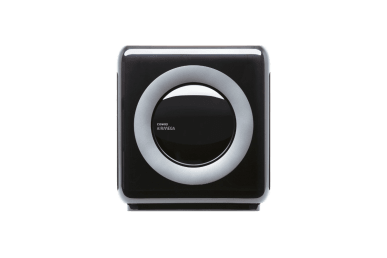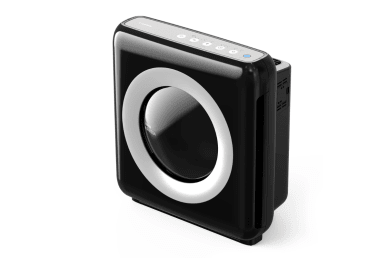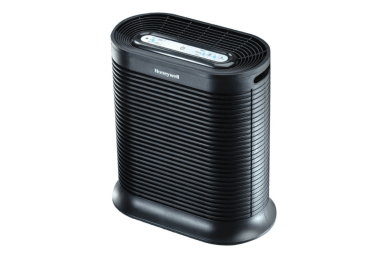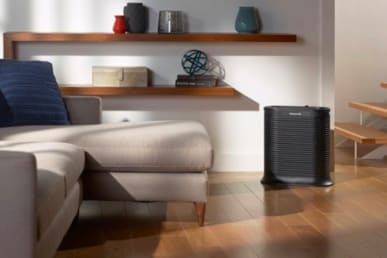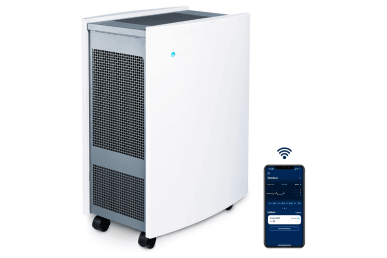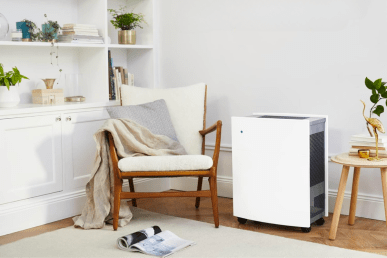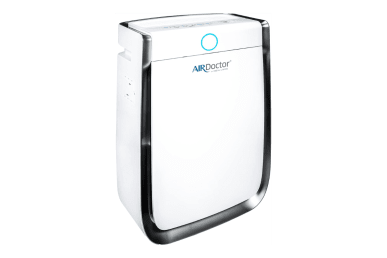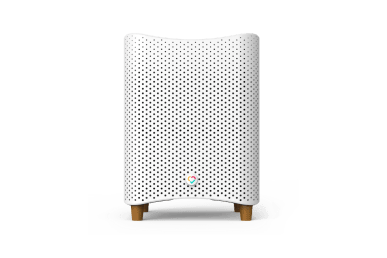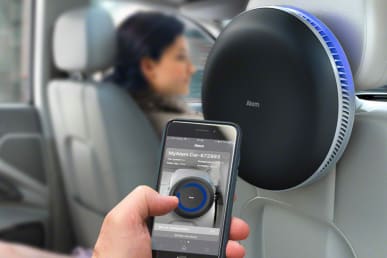Advertisement
6 Best Air Purifiers For Allergies Of 2023 For Beating The Sniffles


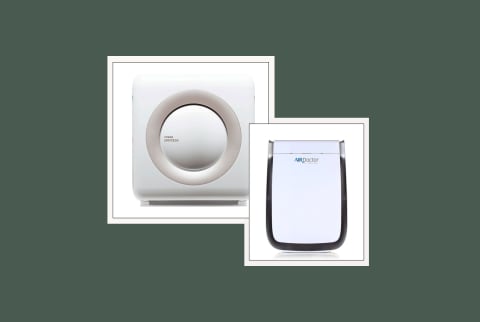
Let's be honest: The only time you should have a runny nose and watery eyes at home is when you're crying to your favorite rom-com. Unfortunately, indoor pollen, dander, and dust mites can trigger these reactions too—especially in those who are prone to allergies.
Air purifiers can keep your home's air clear of these irritants and help you and your family breathe easier. This is essential for more than just allergy relief, as indoor air pollution has been linked to respiratory diseases1, cardiovascular risks2, and even cancer3 in extreme cases.
Here, allergy and functional medicine experts share how air purifiers work and how to vet all the options on the market. We used their intel to pinpoint the six absolute best air purifiers for allergies of the year to keep sniffles at bay.
- Best overall: Coway Airmega AP-1512HH Mighty
- Best for large rooms: BLUEAIR Air Purifier XL
- Best budget: Honeywell HPA100 HEPA Air Purifier
- Best for those with sensitivities: AirDoctor 3000
- Best design: Mila Air Purifier
- Best for the car: IQAir Atem Car
How air purifiers work
Try as we might to keep our living spaces pristine, things like pollen, pet dander, dust mites, smoke, mold spores, and various pollutants always have a way of tracking into our homes. These irritants will affect everyone differently. For those with allergies, they'll often set off an immune reaction that can cause symptoms like runny nose; sneezing, watery eyes; coughing; and itchy nose.
Staying on top of your cleaning routine and taking your shoes off at the door can be the first level of defense against these irritants. If you keep a clean home and still suffer from allergy symptoms, investing in an air purifier will provide another layer of protection.
"Put simply, air purifiers filter out harmful particles thus reducing the levels of environmental allergens and pollutants within an indoor area," Kara Fitzgerald, N.D., functional medicine expert and author of Younger You, tells mindbodygreen.
Lamya Kamel, LAc, DAOM, the director of acupuncture at Aligned Modern Health, says that these purifiers work primarily through filters that catch very small particles and keep them from recirculating in the air.
Some also contain another layer of activated charcoal to further clean the air and remove odors.
Both Fitzgerald and Kamel note that not all air purifiers are created equal. You'll want to make sure to look for one that is independently verified to reduce the irritants you're concerned about, is the right size for your space, and remains easy to care for over time.
How we picked the best air purifiers
- Functionality: The health experts that we spoke to are in agreement: The best air purifiers for allergies contain a HEPA filter. These filters are independently tested to remove up to 99.97% of dust, pollen, mold, bacteria, and other airborne particles larger than 0.3 micron. Some of the purifiers on our list contain additional layers too, but they all start with an ultra-efficient and reliable HEPA.
- Customer reviews: Just because a purifier is powerful doesn't necessarily mean it's easy to live with! We scoured hundreds of customer reviews to find purifiers that are sleek, quiet, and easy to set up and maintain. We also took note of customer service reviews and warranties when deciding on the best companies to buy from.
- Sustainability: As Fitzgerald reminds us, some air purifiers use an electrostatic precipitator or ionizer technology that can produce ozone. Not only can ozone harm the lungs at high concentrations according to the American Lung Association, but it's also a known environmental pollutant. The options on this list don't pump out ozone; just clean air. Some of them are also Energy Star–certified for efficiency.
- Price: We won't beat around the bush: Air purifiers are pricey. We made sure to include a few budget options that are slightly easier on the wallet but still very effective. Beyond upfront cost, you'll also need to buy new filters every once in a while, so we specified how often each machine requires those so you can factor them into your budget.
This powerful purifier upgrades the classic HEPA filter with some smart bells and whistles. For starters, its LED screen gives you a quick read of your air quality at all hours. You can either set it on auto-mode or choose from three fan settings. When no pollution is detected for 30 minutes, the machine will automatically turn off to save you some energy.
The details
The details
What really sets it apart is its sleek design and reasonable price. At 12 pounds, it's significantly lighter and more portable than similar purifiers on the market, and it costs less than $200 to boot. One thing to note is that reviewers who live outside the U.S. report having trouble finding affordable replacement filters, so that's something you'll want to look into before purchasing. The machine also comes with an ionizer, but it can be turned off if you're concerned about ozone.
Pros & cons
Pros & cons
Pros
- 4 fan speeds
- Lightweight and easy to set up
- Has an eco mode
Cons
- Contains ionizer, but it can be turned off
- Replacement filters are expensive and hard to find in some areas
BLUEAIR purifiers come personally recommended by Fitzgerald, who notes that they can capture super-small particles (down to 0.1 micron) thanks to a HEPA filter and a carbon filter that picks up any leftover smoke and pollutants.
The details
The details
Once paired with the accompanying app, the purifier can also send you updates about your air quality and allow you to adjust the speed and noise level to your liking.
This model houses a powerful filter that is suitable for larger rooms up to 700 to 800 square feet, though at 43 pounds, it's heavy and a bit of an eyesore. Like all BLUEAIR purifiers, it's Energy Star certified and ozone safe. Bonus: It's on a major summer sale right now.
Pros & cons
Pros & cons
Pros
- Energy Star certified
- 3 fan speeds
Cons
- Large & bulky
- App can be glitchy
- Expensive
This Honeywell filter is ideal for smaller rooms like the kitchen or dining room. Its HEPA and carbon filters put in the work, and Fitzgerald personally recommends it for dirt, pollen, pet dander, and smoke.
The details
The details
It comes with four air cleaning settings, is Energy Star certified, and circulates through 155 square feet of air nearly five times an hour. To keep it running strong, though, you'll need to replace its HEPA filter pretty frequently (every three months), though you can buy these in a multipack to save some money and headache. Many people note this is a great option for households with pets, and it can keep the air feeling fresh for years when properly maintained. "With regular maintenance and filter changes, these air purifiers still do an excellent job of filtering the air in my home," writes one content customer.
Pros & cons
Pros & cons
Pros
- Energy Star certified
- 4 fan speeds
- Affordable
Cons
- Requires frequent filter changes
Kamel notes that those who are immunocompromised, have a respiratory disease, or are just very sensitive to allergens might want to look for a purifier that contains an ultrafine filter—like the AirDoctor.
The details
The details
The classic AirDoctor cleans 638 square feet of air four times an hour by running it through a carbon prefilter and ultraHEPA filter that removes allergens, dander, and pollutants as small as 0.003 micron in size. "It's even more powerful than a standard HEPA," Kamel notes. It offers four fan speeds, though some reviewers note that even the lowest speed was too loud for them.
Pros & cons
Pros & cons
Pros
- 4 fan speeds
- Designed to catch ultra-small particles
Cons
- Expensive
- Too noisy for some
A modern design and cool shape mean you might not even guess this one's an air purifier at first glance. Mila is a new company setting out to create smart purifiers designed with "real, air-breathing humans in mind."
The details
The details
Mila retrofits their machines with an app that delivers real-time air-quality data and smart settings that automatically quiet down when it senses people in the room. They use a standard HEPA filter but also include some nifty add-ons like a humidity reader and carbon monoxide alarm. Though the Mila can technically treat up to 1,000 square feet, it will work most efficiently in midsized rooms.
Pros & cons
Pros & cons
Pros
- Accompanying app with smart features
- Sleek design
Cons
- Expensive
Why stop at home? Kamel notes that those who spend a lot of time in the closed confines of a car may want to consider bringing a portable filter along for the ride. This one from IQAir contains a HEPA filter to catch common allergens as well as soot and car exhaust from traffic pollution.
The details
The details
It easily latches on to headrests and seats, doesn't take up too much room, and is quiet to run. At 8 pounds, it's easy to move around your car or to another small space you want to clean, like a desk. One downside is that the on/off switch design could use some work, and you need to manually power on the device every time you want to use it. However, it turns off on its own after 15 to 30 minutes of idling to save power, which is a nice touch. Reviewers have found a noticeable difference in their car air's smell and feel after using this nifty little device. And their filtering is going to a good cause: IQAir collects air-quality data to share with public health and environmental organizations like UN-Habitat and Greenpeace.
Pros & cons
Pros & cons
Pros
- Easy to install & move
- Quiet
Cons
- On/off switch is not intuitive
How to choose the best air purifier for allergies
We spoke with experts and researched how to choose the best air purifier for allergies. To determine which is best for you, consider the below factors.
Filter type:
- HEPA: Certified HEPA filters will be best for people with allergies, as they're tested to U.S. Department of Energy standards4 to remove up to 99.97% of particles down to 0.3 micron. This should cover most common allergens like dust, dander, pollen, and mold.
- Charcoal: If you're also concerned about pollutant gases making their way indoors, Fitzgerald recommends looking for a filter that contains activated charcoal. "There is some data showing that activated charcoal is able to remove some gases such as formaldehyde5. Carbon filters may also help capture smaller wildfire smoke particles," she notes. Carbon filters also absorb odors to keep your air smelling as clean as it is.
Check out our list of the best HEPA air purifiers.
Filter granularity:
Shyam Joshi, M.D., an allergist and head of medical for Nectar previously told mindbodygreen, ""HEPA filters, or high-efficiency particulate air filters, are meant to remove 99.97% of particles that are 0.3 micron in diameter or larger, which is 100 times thinner than a human hair. These particles, which include dust, smoke, pollen, and mold spores, can cause irritation or allergic reactions in susceptible people that can lead to nasal congestion, runny nose, cough, or shortness of breath." He adds that, unlike regular air purifier filters, the HEPA rating does ensure a higher level of purification based on the size of particle, which is needed to remove common allergens and irritants from the air. HEPA filters will tackle particles down to 0.3 micron, but you can also find filters that snatch even smaller particles.
Here's a quick rundown of the size of most household irritants, for reference:
- Mold: 4 - 10 microns
- Pollen: 30 microns
- Pet dander: 0.5 - 100 microns
- VOCs: Often 6 microns or less
- Smoke: 0.1 to 1 micron
- Dust: 0.3 - 10 microns
Coverage area:
This is a super-important factor to pay attention to, as you need your filter to clean the entire room that it's placed in. Delilah A. Renegar, D.C., M.D., the director of functional medicine at Aligned Modern Health, recommends putting one in the rooms where you spend the most time—like the bedroom or living room.
Be sure to check out the square footage it covers, and how quickly it cleans that entire space (around four times an hour is a good baseline). "If the area exceeds the capability of the air purifier, then allergens and pollutants will not be filtered out efficiently," notes Fitzgerald.
Noise:
Some air purifiers can run quite loud. If you're sensitive to noise, look for ones that come with multiple fan settings that allow you to control the fan speed/volume.
Upkeep:
Finally, it's important to look for a purifier that makes replacing filters a breeze. Ideally, your machine will alert you when it needs a new filter. Leaving a dirty old filter in for too long will defeat the purpose of your purifier and could make air quality worse over time.
Frequently asked questions
Can air purifiers really relieve your allergies?
The experts featured in this article agree that air purifiers can help relieve allergies—but you need to choose one that fits your needs and take care of it properly. Remember that these remove allergens from the air only; you still need to clean hard surfaces at home as usual.
In addition to purifying their air, Kamel notes that allergy sufferers will also want to look within and treat their bodies with care for long-term allergy relief. Eating well, staying active, and getting enough rest can all go a long way in easing symptoms.
Are HEPA filters good for allergies?
HEPA filters are tested to be effective at minimizing allergens such as smoke, dust, and pollen. "However, they don't capture any of the gases such as volatile organic compounds (VOCs, including benzene, xylene, toluene and formaldehyde from furniture and paint surfaces) or nitrogen dioxide (from traffic pollution)," notes Fitzgerald. For those, you'll want to look for a purifier that has a carbon filter too.
How do you purify air from allergens?
Beyond investing in an air purifier, Fitzgerald notes that cleaning with nontoxic products, using exhaust fans in the kitchen and bathroom, and keeping your home smoke-free will help keep allergens out. Renegar adds that investing in an allergen-free mattress, washing linens regularly, and keeping windows closed on high-pollen or pollution days will also go a long way to promote cleaner air at home.
The takeaway
Allergies can be a real pain—especially when they don't go away once you step inside your front door. Buying an air purifier (or two!) for the rooms where you spend the most time can help keep you comfortable at home.
Look for one that has a HEPA filter, is large enough for your space, and is easy to set up and maintain, like the options on this list. Be sure to pair your new purifier with a solid nontoxic cleaning routine and prepare to feel the difference that clearing the air can bring.
To continue your air purifier search, check out our picks for the best air purifiers for dust, the best air purifiers for mold, and read our commerce editor's full review of the Coway Airmega IconS.
What we've updated since publishing:
3/8/23: After additional research and conversations with experts, we added more information on HEPA filters and updated our "how to choose" section. We've also updated the pros and cons for a few products on our list and included links to other air purifier roundups from our team.
